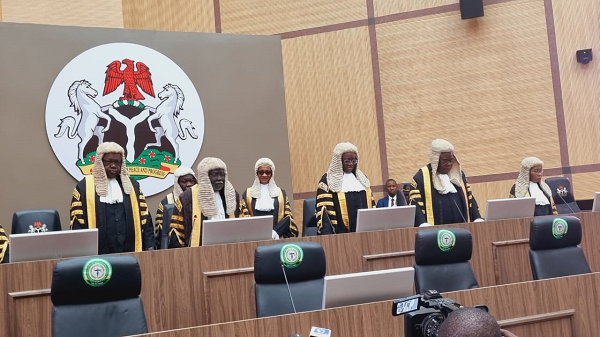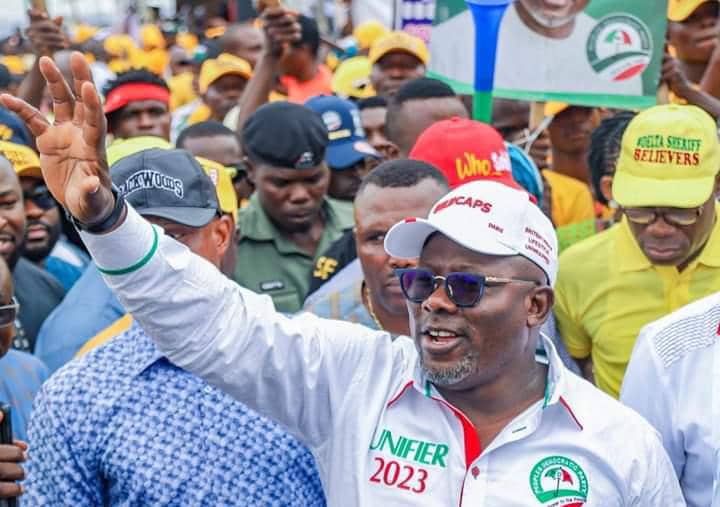File photo of supreme court judges
With the recent judgment of the supreme court on the naira redesign policy, the powers of Nigeria’s president may have been pruned.
Three northern states – Kaduna, Kogi and Zamfara – had filed a suit against the federal government challenging the implementation of the policy.
On February 8, the supreme court restrained the CBN from giving effect to the deadline on the use of old notes following an ex parte application brought by the three states.
The deadline was initially January 31, 2023, but it was extended to February 10, 2023.
Advertisement
Thirteen other states would subsequently join the suit as co-plaintiffs. The states argued that the implementation of the policy has caused untold hardship for Nigerians.
Abubakar Malami, the attorney-general of the federation (AGF), who is the sole respondent, had, however, filed a preliminary objection, arguing that the court lacked the jurisdiction to preside over the matter.
‘HARDLY A DIVIDING LINE’ BETWEEN FG AND THE FEDERATION
Advertisement
On the issue of jurisdiction, the AGF argued that the states challenged the action of the president as head of the executive arm and not the act of the federation or the Federal Republic of Nigeria and that such disputes should be adjudicated at the federal high court.
However, the apex court in its judgment held that there is “hardly a dividing line between the acts of the government of the federation and the acts of the federation”.
“The distinction does not exist to the extent of turning the government of the federation into a sovereign that can act without regard to the federation,” the court held.
The court explained that the federal government was created by the constitution for the purpose of exercising the executive powers of the federation.
Advertisement
“The directive by the president by virtue of his office as such president and head of government of the federation is in exercise of the executive powers of the federation vested on him or her by virtue of S.5(1) of the 1999 constitution,” the court said.
“The government of Nigeria is, therefore, an agent of the Federation of Nigeria as it exercises the executive powers of the federation on behalf of the federation or Federal Republic of Nigeria for its benefit and wellbeing.”
SOVEREIGNTY BELONGS TO THE PEOPLE
Having established that the federal government is an agent of the federation, the supreme court held that sovereignty belongs to individuals who make up the federation.
Advertisement
Citing Section 14(2) of the constitution, the court said: “The sovereignty enjoyed by the federation is owned by the several individual persons constituting the people of the Federation of Nigeria who own the lands that together form the territory of Nigeria.”
In the suit, the states argued that since sovereignty belongs to the people, decisions which have a “reaching disruptive impact on the public governance and economic and social order of the constituent states” — such as the naira redesign — “should have been made after due consultation with the constituents of the federation through the national council of states and the national economic council”.
Advertisement
The seven-member panel of the supreme court agreed with the states and faulted the president for failing to first consult or seek the advice of the NCS and NEC, which are bodies to which the governors of the plaintiff states belong.
The court also agreed that the president failed to meet with the federal executive council or national security council to discuss the economic and security implications of the policy and did not have any form of consultation whatsoever with stakeholders in the Nigerian economy, including state governments, federal and state legislatures, financial institutions, civil societies, professional bodies and other concerned persons.
Advertisement
Although the constitution does not expressly require the president to make such consultations, the supreme court noted that the right of constituents to be consulted by the president before making decisions with far-reaching effects on the governance, economic and social order “is inherent in the idea of a federation in a democracy”.
In addition, the panel faulted the president for not giving reasonable notice to the public as stipulated by the CBN Act.
Advertisement
“Inherent in their status as constituents of the federation under a democratic constitution, is their right to be consulted by the president before the exercise of any executive power of such magnitude as can have far-reaching effects on the governance, economic and social order of each constituent of the federation,” the supreme court panel said.
HAVE THE PRESIDENT’S POWERS BEEN WHITTLED DOWN?
With the judgment of the supreme court, the president may no longer be able to take unilateral economic actions affecting the federation without consulting the states.
Aside from currency redesign, other similar examples include the removal of petrol subsidy and the fixing of the price of petroleum products.
In line with the Petroleum Industry Act (PIA) 2021, Zainab Ahmed, finance minister, said the petrol subsidy would be phased out in the first six months of 2022.
However, controversies have hindered the implementation of the policy with state governors and the federal government yet to reach an agreement.
And since Buhari was not sued over the naira redesign policy in his personal capacity, the judgment is not limited to him or his administration. It will affect whoever holds power as the president of the Federal Republic of Nigeria.
It, therefore, remains to be seen the extent of impact the supreme court verdict will have on other presidents’ ability to make unilateral decisions that may have “far-reaching effects on the governance, economic and social order”.
Add a comment






